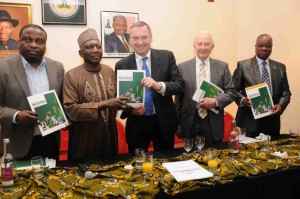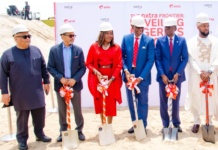From left: Chief Bimbo Folayan, Dr. Dalhatu Tafida, Paul Duffen, David Lamb and Chief Adebayo Oladimeji
[youtube SNp3rkb10kg] [youtube C7LY8IR36a4]
By Peter Olorunnisomo in London: The Banking Hall of the Nigeria High Commission, London on the evening of the Tuesday, 19th February, 2013, indeed, banked a fusion of members of the Nigerian community in Diaspora, members of the diplomatic corps notably Excellencies Ephraim W. Ngare and Nkwelle Ekaney from the Kenyan and Cameroun High Commissions respectively.
Attendance also included the gentlemen of the press and the host Commissioner Ambassador (Dr.) Dalhatu Tafida, OFR, CFR and his deputy Ambassador Oluwatoyin Lawal ably supported by the lieutenants and head, staff of the various departments at the Nigeria Mission House.
The event was the launch of the 3rd edition of Invest in NIGERIA published in partnership with the Nigeria High Commission, London by Newsdesk Media, London. The product, which is a 170-page document of reportage across the plains of both public and private sectors of the Nigerian economy, does deserve commendation largely from the depth of its research, its span of opinion, and the purpose for which it is meant to serve.
Coming out soon, after the intermittent periods of a very high powered delegation from Nigeria featuring key ministers of national policy and development and also the visit of the country’s President to the UK. It does show the efforts of the government of the day to drive the nation’s economy to a viable state in order to prosecute its agenda towards improved public services and achieving macro-economic stability. By reining in international investors and key sector players into the vibrant and developing economic landscape of commercial activities. And particularly that the Nigeria High Commission, UK was playing its part in the realisation of this national objective.
In his invitation to the economic and industrial world, His Excellency, Dr. Dalhatu Tafida established that the enabling environment for investment in Nigeria was ripe and ‘those opportunities can be best grasped when viewing the rapid changes that are taking place in Nigeria – not just in economic terms, but also in the transformation of the political landscape and policy agenda.’
This further explicates the concerns and scope of this investment document. The call is, therefore, not merely to invite investors but also to point out areas of investment using statistics where necessary and applicable to emphasise the credibility of contexts and progress made and foreseeable.
It is noteworthy that some reports have been generated by the sector agencies themselves and, at other times, we see a mandate, structure, and goal(s) others informative e.g. Nexim Bank, The Nigeria Institute of International Affairs, and the agricultural focus of the Ahmadu Bello University.
There is the necessary tour into the political arena which sought to show the enabling structures and policies and the relevance of their achievements in giving stability not just in the local context of the day-to-day administration of the State but also the posture that it is set to support economic growth and development to encourage investors. Project into the benefits of their investments and economic activities if only they would ‘put an arm’ forward.
Oil, which is still a major foreign exchange earner, receives attention by a comparison of policies enunciated and private sector stakeholders. This portrays the intention to strike a verifiable balance in the growth and tools that the sector experiences. It should encourage investors to examine adequately avenues of participation against a history of the development. It should further show clearly the needs that can be exercised to developmental and commercial ends.
Various agencies in the private sector similarly find their space in the magazine to show case what they have achieved and the equities of their investment in the Nigeria economy-space. A more important indicator of this trend is the preparation of these and other similar establishments to match standards across the world and come into very viable and profitable partnerships in achieving visions of growth and development of their sectors. This would, of course, impact positively on service delivery, the retail economy, employment, infrastructural development and the stimulation of the country’s GDP in a private sector driven economy which is at the heart of the current administration.
There is no doubt that almost every sphere of the Nigerian economy requires and investment stimulus or injection that allows its optimum potential to be realised. The import of this can no less be understood by Jonathan administration’s development of a transformation agenda which seeks to impact on almost all areas of national life and which is further borne by areas treated by this document.
However it is necessary to examine the scope of circulation of this document. The evening’s assemblage would not necessarily be sufficient if adequate circulation among the NASDAQs, Nikkei’s, Merrill Lynch, Goldman Sachs, Wall Streets, Financial Times, multinational companies, HSBCs, and international players of the world microcosm-ed in the metropolitan sea of London are not invited and are not served copies with which to stimulate sufficient interest in an emerging market with the potentials of fulfilling fantastic growth and double digit GDP rise by 2014.
Given the excellent assemblage and experience of the writers in assessing the Nigerian economic climate, it cannot be less than expected that this is achieved and also that this effort can translate into the goals expected of it. The amalgam of the diplomatic, political, and journalistic enterprise put into this venture, in its 3rd phase, seeks an evaluation of its achievement(s) in some measurable form. While such documents are, indeed, necessary from time to time in always mark out the stages of growth of Nigeria on this path, it would be clearly desirable that the contents mark stages of continuity and development as may be noted and recorded in consequent editions.
The value here is for the would-be investor to be sufficiently able to access a trail from one edition to another and taper it against the currency of news and the resultant implications for successful investment. A member of the audience had remarked, perhaps knowingly, ‘dem no talk whether person fit put head or not’. This can be interpreted from pidgin English to mean, ‘there is isn’t sufficient conviction to assure an investor’s commitment.’ My response to him was quite simple, ‘how many pages you don read now, now?’ His retort was sharp. ‘Make we see’; meaning let us see.
Could this be an echo in everyone’s mind? It is certainly a hope, an aspiration, a desire borne by everyone with a Nigerian spirit and every wish for ‘great expectations’.











